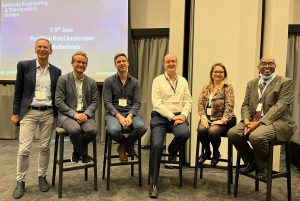Every year, 2.7 million people are bitten by venomous snakes, causing over 130,000 deaths and 400,000 permanent disablements that disproportionally occur among the poor. The unavailability of effective snakebite antivenoms is thus a severe and neglected worldwide problem. Using methods developed over a hundred years ago, most antivenom therapies are still derived from horses, which produce polyclonal antibodies when injected with the snake venom. Developing recombinant products is challenging, however, due to the wide variety of venomous snakes and the extensive heterogeneity and unknown components of snake toxins, which differ between snake species and among species found in different regions. In addition, injecting horse-derived proteins into humans may result in anaphylaxis, serum sickness and inflammation. Innovative treatments for tropical snakebite are urgently needed, and we hope that this Symposium will inspire new collaborations, thereby enabling critical new developments in combating this complex, challenging and important public health issue.
Pictured, from left to right: Paul Parren, Andreas Hougaard Laustsen, Nicolas Casewell, John McCafferty, Manuela Pucca and Abdulraqaz Habib.
Session Chairs:
Prof. Abdulrazaq Habib (Bayero University, Kano, Nigeria)
Prof. Paul W.H.I. Parren (Leiden University Medical Center, Leiden and LAVA Therapeutics, Utrecht, the Netherlands)
Agenda:
| Chairperson’s introduction | Prof. Paul W.H.I. Parren, The Antibody Society & Leiden University Medical Center, Netherlands
View video recording here |
| Global challenges of Snakebite Antivenom Therapy | Speaker: Prof. Abdulrazaq Habib, Bayero University in Kano, Nigeria
Polyclonal antivenom remains the mainstay of snakebite envenoming therapy although adverse reactions often follow its administration. While it is efficacious in many patients with coagulopathy, effect is not durable with Fab format, and it is relatively ineffective against necrosis and neurotoxicity. Despite favorable antivenom cost-effectiveness there are challenges with access, financing, potency, quality, standardization, supply and utilization. View video recording here |
| Therapeutic antibodies against snake venoms therapy | Speaker: Prof. Nicolas Casewell, Centre for Snakebite Research & Interventions, Liverpool School of Tropical Medicine, Liverpool, UK
Snake venoms are mixtures of toxins that vary extensively between and within snake species. This variability has serious consequences for the management of the world’s 1.8 million annual snakebite victims, and negatively impacts upon the cross-species efficacy of polyclonal antibody therapies known as antivenom. In this talk I will discuss how the diversity of drug targets present in venom cause major challenges for the therapeutic utility of polyclonal antibody treatments, and how knowledge of venom variation can be used to help inform appropriate antivenom use. View video recording here |
| Snakebite venom variation and its impact on the efficacy of polyclonal antibody | Speaker: Prof. Manuela Pucca, Medical School, Federal University of Roraima – Brasil
In Brazil, snakebites are considered a global neglected disease, presenting more than 28,000 bites each year, with high impact in the Brazilian Amazon. Currently, antivenoms based on polyclonal antibodies produced in horses are the only specific treatment. The majority (~70%) of the antibodies in most antivenoms, however, are not directed against venom components, and the remaining 30% of horse-derived antibodies may not neutralize important toxins. To address this problem, new antibody discovery technologies, antibody engineering approaches, and antibody manufacturing processes have been applied to generating antivenoms. In this presentation, the snakebite neglected problem in the Brazilian Amazon will be discussed. Past, present, and future production of antivenoms will be outlined, and advances in the next generation of antivenoms will be presented. In addition, the Amazonia Snakebite Initiative will be announced. View video recording here |
| Can we ‘deconvolute’ polyclonal antivenoms to create defined antibody cocktails? | Speaker: Dr. John McCafferty, IONTAS, UK
Equine polyclonal antibodies such as “EchiTab-plus-ICP”, used in sub-Saharan Africa save lives of snakebite victims. This century-old approach however requires injection of grams of an ill-defined, variable mix of non-human protein to snakebite victims. There is an opportunity in revolutionising anti-venom treatment by using recombinant antibody technology to identify and combine the active components from polyclonal antivenom responses. This presentation will review the opportunities and challenges. View video recording here |
| Recombinant antivenom based on oligoclonal broadly neutralizing antibodies | Speaker: Prof. Andreas Hougaard Laustsen, Department of Biotechnology and Biomedicine, Technical University of Denmark, Lyngby, Denmark
Snakebite envenomings are serious medical emergencies that are currently still treated with polyclonal antibodies derived from the plasma of immunized animals. With the advent of recombinant DNA technology and the many advances that have taken place within antibody discovery methods, an opportunity now presents itself to modernize envenoming therapy. Here, recent progress and perspectives in the discovery and use of oligoclonal broadly-neutralizing antibodies against snake venoms will be presented. View video recording here |
| Panel discussion | Speakers: All
View video recording here |



